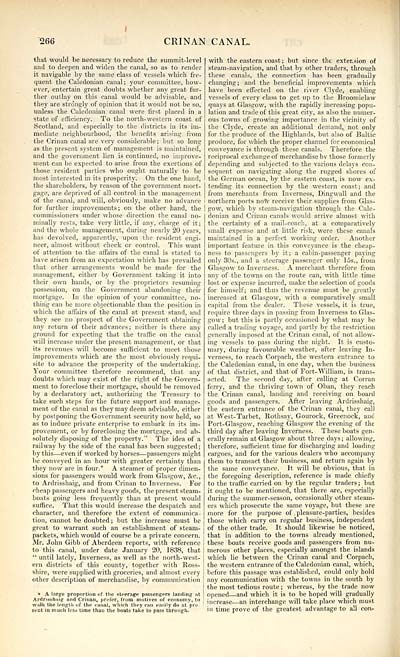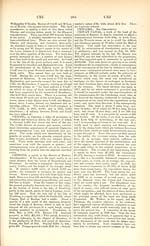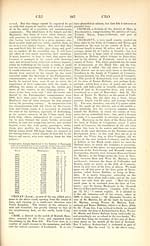Topographical, statistical, and historical gazetteer of Scotland > Volume 1
(348) Page 266
Download files
Complete book:
Individual page:
Thumbnail gallery: Grid view | List view

266
CRINAN CANAL.
that would be necessary to reduce the summit-level
and to deepen and widen the canal, so as to render
it navigable by the same class of vessels which fre-
quent the Caledonian canal; your committee, how-
ever, entertain great doubts whether any great fur-
ther outlay on this canal would be advisable, and
they are strongly of opinion that it would not be so,
unless the Caledonian canal were first placed in a
state of efficiency. To the north-western coast of
Scotland, and especially to the districts in its im-
mediate neighbourhood, the benefits arising from
the Crinan canal are very considerable; but so long
as the present system of management is maintained,
and the government lien is continued, no improve-
ment can be expected to arise from the exertions of
those resident parties who ought naturally to be
most interested in its prosperity. On the one hand,
the shareholders, by reason of the government mort-
gage, are deprived of all control in the management
of the canal, and will, obviously, make no advance
for further improvements; on the other hand, the
commissioners under whose direction the canal no-
minally rests, take very little, if any, charge of it;
and the whole management, during nearly 20 years,
has devolved, apparently, upon the resident engi-
neer, almost without check or control. This want
of attention to the affairs of the canal is stated to
have arisen from an expectation which has prevailed
that other arrangements would be made for the
management, either by Government taking it into
their own hands, or by the proprietors resuming
possession, on the Government abandoning their
mortgage. In the opinion of your committee, no-
thing can be more objectionable than the position in
which the affairs of the canal at present stand, and
they see no prospect of the Government obtaining
any return of their advances; neither is there any
ground for expecting that the traffic on the canal
will increase under the present management, or that
its revenues will become sufficient to meet those
improvements which are the most obviously requi-
site to advance the prosperity of the undertaking.
Your committee therefore recommend, that any
doubts which may exist of the right of the Govern-
ment to foreclose their mortgage, should be removed
by a declaratory act, authorizing the Treasury to
take such steps for the future support and manage-
ment of the canal as they may deem advisable, either
by postponing the Government security now held, so
as to induce private enterprise to embark in its im-
provement, or by foreclosing the mortgage, and ab-
solutely disposing of the property." The idea of a
railway by the side of the canal has been suggested;
by this — even if worked by horses — passengers might
be conveyed in an hour with greater certainty than
they now are in four.* A steamer of proper dimen-
sions for passengers would work from Glasgow, &c,
to Ardrisshaig, and from Crinan to Inverness. For
cheap passengers and heavy goods, the present steam-
boats going less frequently than at present would
suffice. That this would increase the despatch and
character, and therefore the extent of communica-
tion, cannot be doubted ; but the increase must be
great to warrant such an establishment of steam-
packets, which would of course be a private concern.
Mr. John Gibb of Aberdeen reports, with reference
to this canal, under date January 20, 1838, that
" until lately, Inverness, as well as the north-west-
ern districts of this county, together with Ross-
shire, were supplied with groceries, and almost every
other description of merchandise, by communication
» A large proportion of the Bteerage passengers landing at
Ardrisshaig and Crinan, prefer, from motives of economy, to
walk the length of the canal, which they can easily do at pre
sent in much lead time than the boats take to pass through.
with the eastern coast ; but since the extension of
steam-navigation, and that by other traders, through
these canals, the connection has been gradually
changing; and the beneficial improvements which
have been effected on the river Clyde, enabling
vessels of every class to get up to the Broomielavv
quays at Glasgow, with the rapidly increasing popu-
lation and trade of this great city, as also the numer-
ous towns of growing importance in the vicinity of
the Clyde, create an additional demand, not only
for the produce of the Highlands, but also of Baltic
produce, for which the proper channel for economical
conveyance is through these canals. Therefore the
reciprocal exchange of merchandise bv those formerly
depending and subjected to the various delays con-
sequent on navigating along the rugged shores of
the German ocean, by the eastern coast, is now ex-
tending its connection by the western coast; and
from merchants from Inverness, Dingwall and the
i northern ports notv receive their supplies from Glas-
gow, which by steam-navigation through the Cale-
donian and Crinan canals would arrive almost with
the certainty of a mail-coach, at a comparatively
small expense and at little risk, were these canals
maintained in a perfect working order. Another
important feature in this conveyance is the cheap-
ness to passengers by it; a cabin-passenger paying
only 30s., and a steerage passenger only 15s., from
Glasgow to Inverness. A merchant therefore from
any of the towns on the route can, with little time
lost or expense incurred, make the selection of goods
for himself; and thus the revenue must be greatly
increased at Glasgow, with a comparatively small
capital from the dealer. These vessels, it is true,
require three days in passing from Inverness to Glas-
gow; but this is partly occasioned by what may be
called a trading voyage, and partly by the restriction
generally imposed at the Crinan canal, of not allow-
ing vessels to pass during the night. It is custo-
mary, during favourable weather, after leaving In-
verness, to reach Corpach, the western entrance to
the Caledonian canal, in one day, when the business
of that district, and that of Fort- William, is trans-
acted. The second day, after calling at Corran
ferry, and the thriving town of Oban, they reach
the Crinan canal, landing and receiving on board
goods and passengers. After leaving Ardrisshaig,
the eastern entrance of the Crinan canal, they call
at West-Tarbet, Rothsay, Gourock, Greenock, and
Port- Glasgow, reaching Glasgow the evening of the
third day after leaving Inverness. These boats gen-
erally remain at Glasgow about three days ; allowing,
therefore, sufficient time for discharging and loading
cargoes, and for the various dealers who accompany
them to transact their business, and return again by
the same conveyance. It will be obvious, that in
the foregoing description, reference is made chiefly
to the traffic carried on by the regular traders ; but
it ought to be mentioned, that there are, especially
during the summer-season, occasionally other steam-
ers which prosecute the same voyage, but these are
more for the purpose of , pleasure-parties, besides
those which carry on regular business, independent
of the other trade. It should likewise be noticed,
that in addition to the towns already mentioned,
these boats receive goods and passengers from nu-
merous other places, especially amongst the islands
which lie between the Crinan canal and Corpach,
the western entrance of the Caledonian canal, which,
before this passage was established, could only hold
any communication with the towns in the south by
the most tedious route ; whereas, by the trade now
opened — and which it is to be hoped will gradually
increase — an interchange will take place which must
in time prove of the greatest advantage to all con-
CRINAN CANAL.
that would be necessary to reduce the summit-level
and to deepen and widen the canal, so as to render
it navigable by the same class of vessels which fre-
quent the Caledonian canal; your committee, how-
ever, entertain great doubts whether any great fur-
ther outlay on this canal would be advisable, and
they are strongly of opinion that it would not be so,
unless the Caledonian canal were first placed in a
state of efficiency. To the north-western coast of
Scotland, and especially to the districts in its im-
mediate neighbourhood, the benefits arising from
the Crinan canal are very considerable; but so long
as the present system of management is maintained,
and the government lien is continued, no improve-
ment can be expected to arise from the exertions of
those resident parties who ought naturally to be
most interested in its prosperity. On the one hand,
the shareholders, by reason of the government mort-
gage, are deprived of all control in the management
of the canal, and will, obviously, make no advance
for further improvements; on the other hand, the
commissioners under whose direction the canal no-
minally rests, take very little, if any, charge of it;
and the whole management, during nearly 20 years,
has devolved, apparently, upon the resident engi-
neer, almost without check or control. This want
of attention to the affairs of the canal is stated to
have arisen from an expectation which has prevailed
that other arrangements would be made for the
management, either by Government taking it into
their own hands, or by the proprietors resuming
possession, on the Government abandoning their
mortgage. In the opinion of your committee, no-
thing can be more objectionable than the position in
which the affairs of the canal at present stand, and
they see no prospect of the Government obtaining
any return of their advances; neither is there any
ground for expecting that the traffic on the canal
will increase under the present management, or that
its revenues will become sufficient to meet those
improvements which are the most obviously requi-
site to advance the prosperity of the undertaking.
Your committee therefore recommend, that any
doubts which may exist of the right of the Govern-
ment to foreclose their mortgage, should be removed
by a declaratory act, authorizing the Treasury to
take such steps for the future support and manage-
ment of the canal as they may deem advisable, either
by postponing the Government security now held, so
as to induce private enterprise to embark in its im-
provement, or by foreclosing the mortgage, and ab-
solutely disposing of the property." The idea of a
railway by the side of the canal has been suggested;
by this — even if worked by horses — passengers might
be conveyed in an hour with greater certainty than
they now are in four.* A steamer of proper dimen-
sions for passengers would work from Glasgow, &c,
to Ardrisshaig, and from Crinan to Inverness. For
cheap passengers and heavy goods, the present steam-
boats going less frequently than at present would
suffice. That this would increase the despatch and
character, and therefore the extent of communica-
tion, cannot be doubted ; but the increase must be
great to warrant such an establishment of steam-
packets, which would of course be a private concern.
Mr. John Gibb of Aberdeen reports, with reference
to this canal, under date January 20, 1838, that
" until lately, Inverness, as well as the north-west-
ern districts of this county, together with Ross-
shire, were supplied with groceries, and almost every
other description of merchandise, by communication
» A large proportion of the Bteerage passengers landing at
Ardrisshaig and Crinan, prefer, from motives of economy, to
walk the length of the canal, which they can easily do at pre
sent in much lead time than the boats take to pass through.
with the eastern coast ; but since the extension of
steam-navigation, and that by other traders, through
these canals, the connection has been gradually
changing; and the beneficial improvements which
have been effected on the river Clyde, enabling
vessels of every class to get up to the Broomielavv
quays at Glasgow, with the rapidly increasing popu-
lation and trade of this great city, as also the numer-
ous towns of growing importance in the vicinity of
the Clyde, create an additional demand, not only
for the produce of the Highlands, but also of Baltic
produce, for which the proper channel for economical
conveyance is through these canals. Therefore the
reciprocal exchange of merchandise bv those formerly
depending and subjected to the various delays con-
sequent on navigating along the rugged shores of
the German ocean, by the eastern coast, is now ex-
tending its connection by the western coast; and
from merchants from Inverness, Dingwall and the
i northern ports notv receive their supplies from Glas-
gow, which by steam-navigation through the Cale-
donian and Crinan canals would arrive almost with
the certainty of a mail-coach, at a comparatively
small expense and at little risk, were these canals
maintained in a perfect working order. Another
important feature in this conveyance is the cheap-
ness to passengers by it; a cabin-passenger paying
only 30s., and a steerage passenger only 15s., from
Glasgow to Inverness. A merchant therefore from
any of the towns on the route can, with little time
lost or expense incurred, make the selection of goods
for himself; and thus the revenue must be greatly
increased at Glasgow, with a comparatively small
capital from the dealer. These vessels, it is true,
require three days in passing from Inverness to Glas-
gow; but this is partly occasioned by what may be
called a trading voyage, and partly by the restriction
generally imposed at the Crinan canal, of not allow-
ing vessels to pass during the night. It is custo-
mary, during favourable weather, after leaving In-
verness, to reach Corpach, the western entrance to
the Caledonian canal, in one day, when the business
of that district, and that of Fort- William, is trans-
acted. The second day, after calling at Corran
ferry, and the thriving town of Oban, they reach
the Crinan canal, landing and receiving on board
goods and passengers. After leaving Ardrisshaig,
the eastern entrance of the Crinan canal, they call
at West-Tarbet, Rothsay, Gourock, Greenock, and
Port- Glasgow, reaching Glasgow the evening of the
third day after leaving Inverness. These boats gen-
erally remain at Glasgow about three days ; allowing,
therefore, sufficient time for discharging and loading
cargoes, and for the various dealers who accompany
them to transact their business, and return again by
the same conveyance. It will be obvious, that in
the foregoing description, reference is made chiefly
to the traffic carried on by the regular traders ; but
it ought to be mentioned, that there are, especially
during the summer-season, occasionally other steam-
ers which prosecute the same voyage, but these are
more for the purpose of , pleasure-parties, besides
those which carry on regular business, independent
of the other trade. It should likewise be noticed,
that in addition to the towns already mentioned,
these boats receive goods and passengers from nu-
merous other places, especially amongst the islands
which lie between the Crinan canal and Corpach,
the western entrance of the Caledonian canal, which,
before this passage was established, could only hold
any communication with the towns in the south by
the most tedious route ; whereas, by the trade now
opened — and which it is to be hoped will gradually
increase — an interchange will take place which must
in time prove of the greatest advantage to all con-
Set display mode to: Large image | Transcription
Images and transcriptions on this page, including medium image downloads, may be used under the Creative Commons Attribution 4.0 International Licence unless otherwise stated. ![]()
| Gazetteers of Scotland, 1803-1901 > Topographical, statistical, and historical gazetteer of Scotland > Volume 1 > (348) Page 266 |
|---|
| Permanent URL | https://digital.nls.uk/97441722 |
|---|
| Description | Volume first. A-H. |
|---|---|
| Attribution and copyright: |
|

